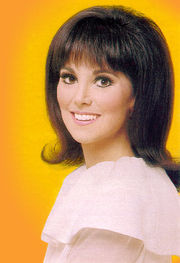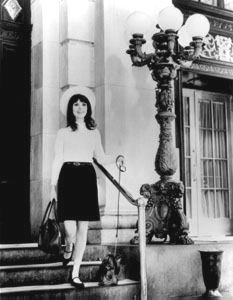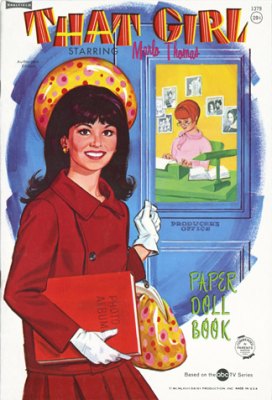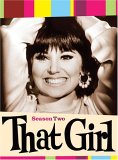| Reviews & Columns |
|
Reviews DVD TV on DVD Blu-ray 4K UHD International DVDs In Theaters Reviews by Studio Video Games Features Collector Series DVDs Easter Egg Database Interviews DVD Talk Radio Feature Articles Columns Anime Talk DVD Savant Horror DVDs The M.O.D. Squad Art House HD Talk Silent DVD
|
DVD Talk Forum |
|
|
| Resources |
|
DVD Price Search Customer Service #'s RCE Info Links |
|
Columns
|
|
|
That Girl - Season Two
There's a moment on one of the commentary tracks for That Girl: Season Two, where series co-creator and co-executive producer Bill Perskey says something quite contrary to the message that star Marlo Thomas tries to get across about the social and political significance of That Girl. For the episode entitled, ODPDYPAHIMCAIFSS, the story's main conflict is Donald Hollinger's mother finding a pair of his pants hanging among Ann Marie's clothes, whereby she assumes that the unmarried couple are sleeping together. As the complications unfolds, Marlo Thomas, on the commentary track, refers to a rather vulgar moment (one of many) in a Friends episode (Thomas guest starred as Jennifer Aniston's mother on the show), with her tone of voice marveling at such a vulgar reference's inclusion in a prime-time TV show. Perskey, faced with the almost Pollyanna-type innocence of That Girl, as well as obviously being taken aback by Thomas' Friends reference (he exclaims, Oh, God!), declares, "It was a simpler time, and a better one, I think," referring to the era of 1960s TV. Marlo Thomas replies, "But there was a sexual revolution going on in the country, just not on TV." As well, in the documentary That Show...That Woman...The Creation of That Girl: A New Beginning for Women included in this DVD set, a text quote is included from Sam Denoff, the other co-creator and co-executive producer of the show, that doesn't seem to stay on-message for Thomas, either: The sexual tension was there, but we didn't have to resort to all the crap you see now about people jumping in and out of bed. It wasn't necessary for the comedy.

If you listen to Thomas on the documentary, she makes a case for That Girl being a pivotal moment not just in TV history, but in the history of women's rights. Initially, she makes a strong case for the show's positive influence on young women viewers, who saw a vitally important role model in Ann Marie, a single actress in New York City, who enjoys a vaguely undetermined relationship (although the show makes it very clear they're not sleeping together) with her kind, thoughtful boyfriend Donald Hollinger, who genuinely loves her, and repeatedly offers to marry her. Ann Marie enjoys being independent; she enjoys being single, and she enjoys pursuing her career first, without entertaining the thought of falling back on marriage to Donald whenever the going gets tough. I agree with that assessment of That Girl. The show's success (never in the Nielsen Top Thirty for the year, but still a solid mid-level performer) allowed the networks to start the first primitive steps forward in showing female characters who weren't just wives or secretaries, and it directly paved the way for one of the other most influential TV shows about women and their roles in society: The Mary Tyler Moore Show.
While I agree that That Girl did provide a positive role model for young women, I don't think the show was some kind of seismic event that Thomas and other historians claim. Repeatedly throughout the documentary, Thomas makes sweeping generalizations about women in America during the mid-1960s which many women today might find offensive. While it's true that most traditional role models for women at the time stressed motherhood and family first, it's a tremendous oversimplification on Thomas' part to state that not only didn't young women of the time follow their mother's examples (quite a few did, and still do, actually), but that somehow the vast majority of American women prior to That Girl didn't accomplish anything other than making a pot roast for hubby. Thomas' repeatedly mentions her own mother, the wife of show business giant Danny Thomas, and how she, Thomas, wasn't going to follow in her mother's footsteps. That's fine for Thomas, but that wasn't the experience, nor the desire, of every young woman in America -- millions of young women in 1965 had mothers who held all kinds of occupations and professions besides housewife, and who learned to be independent, educated women by their mothers' examples. And as well, just because millions of young girls did follow the more traditional roles of wife and mother set by their own mothers, who's to say that was somehow "less" emotionally fulfilling than what Thomas advocates?
As to That Girl helping to "create" the women's movement, we are, after all, talking about a cute, funny television sitcom. I don't think television "creates" anything in society. Like most art, it's a mirror of society. There were plenty of Ann Maries out there prior to the show's debut, just as there were plenty of Archie Bunkers out there, prior to All in the Family's bow. And just as importantly, Americans weren't suddenly awakened out of their ignorant slumber to types like Ann Marie or Archie; millions of Americans lived or worked with people just like them. That's probably why the shows were hits; they struck a chord of recognition with audiences -- not a hammerblow of revelation. Contrary to what actors and producers and writers in Hollywood think, most Americans are pretty bright; they don't need a TV sitcom to awaken and educate them on large-scale social issues.

Perhaps when Thomas speaks of the influence of the show, she's speaking only of what fits in with her particular viewpoint. In the documentary, she poignantly speaks of getting letters from abused women, asking where they could go for help, as well as letters from women encouraging Thomas to resist the pressures from the network to have the character married off. I'm sure she did receive those kinds of letters, but I'm also sure she received just as many, if not more, letters from happy, contented women (and men) who simply thanked her for the show -- or who urged her character to marry Donald. But the documentary's tone doesn't allow for that other side to be aired, and that's what I find fascinating about Thomas' reference to Friends (she mentions it in the documentary, too), as opposed to the statements made by the co-creators of the show. Where does Thomas stand on what's happened to TV (and society) today? Obviously, the creators of That Girl think it's gone too far the other way, with a show like Friends as offensive (remember, that show was on at 8:00 -- the so-called "Family Hour" -- with many parents watching it with their kids) in its sexually suggestive, dumbed-down material, as innocent, smart That Girl was unoffensive. I would imagine she's all for it, but hers is an increasingly less popular view.
I suspect that Thomas' way of thinking about women's roles in society is fairly outdated now -- or at least, it's a viewpoint so a part of the norm now, so assimilated and transformed, that it's self-evident. While Thomas still takes a tone that smacks of anti-traditional, anti-marriage roles for women, most women in today's society realize that marriage and education and career aren't mutually exclusive goals -- if they choose to pursue any or all of them. Generalized feminist rhetoric from Thomas misses the point of where women are today in society.
That being said, how's the show? Well, political and social considerations aside, That Girl is a delightfully funny sitcom that showcases Thomas' almost supernatural likeability. I'm not sure why she never pursued a stronger career in movies, or followed up That Girl with another series, but she's an amazingly intuitive, natural performer. You can't not like her; she literally beams on camera. But liking a performer isn't everything; Thomas has a real knack for comedic timing and line readings that seem way beyond her years here. Matching her step for step is Ted Bessell as Donald. Stuck with a tough role -- basically playing straight man to Thomas' Ann -- Bessell is right on the money with his character, finding a new way each episode to basically play the same scene each week: listening to Ann's new dilemma, offering advice, watching that advise get rejected, watching the comedic confusion that results, and then telling Ann that he loves her at the end. He's always believable and square, and his chemistry with the bubbly Thomas is terrific. Great character actors and guest stars appear in That Girl: Season Two, including Ethel Merman, Rob Reiner, Bill Bixby, Ruth Buzzi, Henry Jones, Rich Little, Sandy Kenyon, Paul Smith, Bernie Kopell, Robert Alda, Teri Garr, Norman Fell, Joan Blondell, and Sid Caesar. The plots for That Girl are as smart and cute as the performers, and particularly well written. This was the first year that TV legend Danny Arnold produced the show, and writers such as James Brooks (The Mary Tyler Moore Show, Terms of Endearment) contribute here. Of course, this is Fantasyland New York City, where Ann lives in a terrific apartment (while seemingly making little money), while she seems to have an endless supply of the very latest clothes -- she looks like Barbie's friend Skipper, with the complete Mattel clothing line-up at her disposal. Her nice boyfriend has a nice job, her neighbors are friendly and outgoing, her overprotective father only comes and bothers her occasionally, the streets are relatively clean, and the city seems to exist only for Ann's taking. What's always striking to me when watching vintage TV is the total lack of meanspirited irony and cynicism that seems to infest TV shows today -- particularly comedies. Don't get me wrong; I love Seinfeld. But for balance, it's nice to see something like That Girl, and remember when comedy didn't have to be mean, when comedy could just be about light entertainment.

The DVDs:
The Video:
I understand there were some image problems with the first season of That Girl, but no such problems exist with That Girl: Season Two. The full screen image is crystal clear, with bold, strong colors. Some individual episodes have occasional color fading (sometimes a very slight turn to pink), but overall, these look amazing. Particularly nice is the big-screen look to the cinematography -- TV looked so much better back then, didn't it? Also of special note, I really commend Shout Factory for putting together such an attractive box set package. The graphics are incredible, and the menus, complete with stills of Ann and Donald popping up, are lots of fun. It's a gorgeous looking box set.
The Video:
The original mono soundtrack is perfectly adequate for watching That Girl: Season Two as it was originally presented.
The Extras:
As mentioned above, there's a 22 minute documentary called That Show...That Woman...The Creation of That Girl: A New Beginning for Women. It's an interesting, if generalized and slanted, view of the show and its impact. Marlow Thomas appears here. As well, there's an unsold pilot that Thomas starred in, prior to That Girl, called Two's Company, included here. Starring Thomas and Ron Hussman, Two's Company shows the mediocre direction Thomas' career might have taken, had she succeeded with this pilot. It's all about a young married couple, and the confusion that happens when the stuffy husband finds out his bride may be pregnant. It's a tedious little comedy, made hilarious whenever guest star Paul Lynde appears. It's interesting to see Thomas really kiss her husband -- too bad she never kissed Donald that way! And finally, there are four commentary tracks -- one per disc -- for four episodes of the show (Pass the Potatoes, When in Rome, Fur All We Know, and ODPDYPAHIMCAIFSS). Thomas is joined by co-creator and producer Bill Perskey; I wish they had more to say along the lines of what I quoted above in the review, but unfortunately, the commentaries amount to little else than Thomas saying, "That's cute," about ten times. They both seem to really enjoy watching the episodes, but you won't get much valuable information out of them. Just a note, the DVD liner notes mix up the location of the extras between disc one and two; the documentary appears on disc two, not one, and the unsold pilot appears on disc one, not disc two.
Final Thoughts
I had a blast revisiting Ann Marie and Donald in the 30 episodes included in That Girl: Season Two. A staple of afternoon syndicated reruns when I was a kid, That Girl was a funny, smart, cute show with two enormously appealing actors working in perfect synch. The new opening credit sequence shot for Season Two is probably the one everybody remembers, with Marlo running around a cheery New York City, flying her signature logo kite (too bad she didn't throw her white sailor hat in the air, and beat Mary Tyler Moore to the punch four years early), and winking at herself, dressed as a queen in a department store window. The stories were silly, but charming and extremely well written, and yes, That Girl provided an essential gateway for the TV networks to start treating women as individuals -- not as stock characters. That Girl, despite Thomas' assertions to the contrary, wasn't the "hand grenade" that blew apart traditional women's roles in America, but it did, in a big way, reflect what was already well under way in America. Marlo Thomas' determination to stay true to the original origins of the character deserves most of the credit for that gateway; she's simply terrific here. I highly recommend That Girl: Season Two.
Paul Mavis is an internationally published film and television historian, a member of the Online Film Critics Society, and the author of The Espionage Filmography.


|
| Popular Reviews |
| Sponsored Links |
|
|
| Sponsored Links |
|
|
| Release List | Reviews | Shop | Newsletter | Forum | DVD Giveaways | Blu-Ray | Advertise |
|
Copyright 2024 DVDTalk.com All Rights Reserved. Legal Info, Privacy Policy, Terms of Use,
Manage Preferences,
Your Privacy Choices | |||||||











